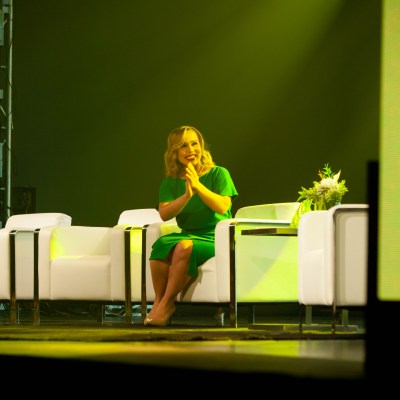From black swan memos and heart-to-hearts to not-so-subtle emails asking for on-the-record confirmations that your startup does, indeed, have revenue, investors have a lot to say about the downturn.
Yet, it’s a quieter and more realistic truth that has landed my attention as of late: For diverse founders, the downturn is nothing new. Some investors, largely those who focus on backing historically overlooked founders, say that the crackdown on tech companies isn’t impacting diverse founders as harshly as their overly funded, homogeneous counterparts because of pre-existing biases.
All Raise CEO Mandela SH Dixon, who joined the Equity podcast fresh off of her annual summit, told TechCrunch that women and racially diverse investors, founders and operators don’t have the “doom-and-gloom mentality because we are so used to doing more with less.”
“We are so used to not having access to this influx of capital that we have already adjusted and built muscles and capacity to weather a lot of storms that more privileged founders who have like this never-ending flow of capital and access to advice and insider information” haven’t had to deal with, she said. “We as women, and as women of color, have a long history of weathering storms, so this isn’t new to us.”
Dixon’s belief — that minority founders may be more prepared for a pullback because they were already experiencing one — feels both spot-on and nuanced. Yes, diverse founders still receive disproportionately less venture capital financing than their homogeneous counterparts, making them smarter with their money. We have reams of studies spanning years that show that women and diverse teams can be more capital-efficient.
At the same time, if even the small dollars heading their way are at risk, won’t the industry slide further and further from a more equitable spot?
It’s here that All Raise’s mission could be threatened. The nonprofit has long defined its goals — to increase the amount of seed funding that goes to female founders from 11% to 23% by 2030 and double the percentage of female decision-makers at U.S. firms by 2028 — by looking at women in aggregate. As data shows, Black and Latinx women receive disproportionately less venture capital money than white women, and nonbinary founders can also face higher hurdles when seeking funding.
Dixon said that she’s feeling good about these goals but noted that she wants to look into the breakdown of mixed-gender teams, female-only teams and limited partner makeup. She also echoed a point she focused on when first taking over from former All Raise CEO Pam Kostka: Dixon wants to make leadership at the nonprofit more diverse and reflective of the community it serves.

All Raise CEO Mandela SH Dixon and All Raise chief of staff Paige Hendrix Buckner. Image Credits: All Raise
Another set of investors featured on a recent Equity podcast episode echoed Dixon’s optimism for diverse founders during the recent All Raise VC summit.
Heidi Patel, a managing partner at Rethink Impact, said that women are going to “feel the pinch because VC is closing ranks.” “The good thing is, we focus on women and women are uniquely prepared to really thrive in this moment, right?” she said. “They’re doing more with less, they’re not expecting the world to come up with solutions, so they are super scrappy.”
What’s missing, Patel said, is a commitment to investing in diverse founders (not just accepting that they’ll be able to handle the downturn well). She called on limited partners to back funds with diversity as an investment strategy; Rethink itself went from backing any company that had a female executive to focusing exclusively on female CEOs. While it’s a narrower interpretation of diversity, it’s one that she thinks gets into the heart of investing in the decision-makers at a business.
January Ventures’ Jennifer Neundorfer has a similar thesis to Rethink in that she wants to serve as “the family and friends round” for those without privileged networks in Silicon Valley. Neundorfer, who recently closed a $21 million fund alongside investment partner Maren Bannon, said that the downturn is actually pushing them to scale up investing again.
“In the back half of 2021, we had actually slowed down,” Neundorfer said, saying that the firm did only two investments during that period instead of the typical cadence of six to seven. “We felt that the market was just way overheated, deals were overvalued, and so we’ve already almost taken our pause.” Now, as deal prices come down due to the market compression, January Ventures thinks that “this is actually a really good time to be investing in the early stage.”
“Great companies are founded out of constraints,” she added. “And we see a lot of great talent that is suddenly available.” The VC firm started a fellowship program that gives people who were laid off or want to make the jump to entrepreneurship $25,000 to start building. Jenny Lefcourt of Freestyle Ventures, a firm that recently closed a $130 million fund, said that she plans “on investing in this time where other people are fearful … we’re very open for business.”
In some ways, it’s precisely the job of venture capitalists to continue investing despite economic cycles. However, given the layoffs and pulled term sheets, it’s helpful to hear that some investors aren’t just being active — they’re revving back up.
Rebecca Kaden, partner at Union Square Ventures, put it well:
We’re an investment firm and we will invest through cycles. We always call it a high-conviction, low-velocity model. Our goal is to continually deploy at a steady pace, but not high velocity, through all cycles when opportunities meet the thesis that we’re going after.
